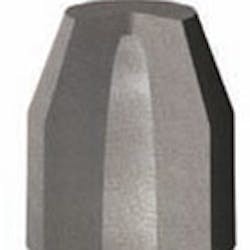Mini-Risers are a Big Improvement for Feeding Performance
Mini-riser products developed by ASK Chemicals are a significant advance in feeding system technology, offering an efficiency rating of 70% compared to cylindrical sleeves, which are determined to be about 30% efficient. The development provides an opportunity to reduce the overall size of the riser, significantly increasing the casting yield and reducing the space needed to apply them. Mini-risers also are seen as a step forward in the continuous improvement of feeding systems.
The first advance in mini-riser technology was the introduction of a spring pin to support the mini-riser on green sand patterns, and creating a sand layer between the riser and casting in order to avoid contact between the exothermic material and the sand. This increased the surface quality of the casting, which may be compromised by the reactions of the exotherm during solidification. The introduction of shell-sand breaker cores, which are in direct contact with the casting, reduces cleaning costs even more. However, as more modern, high-pressure molding lines with higher compaction of the molding sand became more popular, risers with breaker cores achieved their limit. The pressure of the molding sand may destroy the breaker core, which can create inclusion defects in the casting. Also, breaker cores can wear down the pattern surface, which can be seen clearly on the casting surface.
Another important advance was the merging of ASK Chemicals’ Exactcast cold-box technology into the mini-riser concept. The first mini-risers used a sand-based exothermic formulation, as opposed to the traditional fiber slurry-based riser sleeves. The sand-based exothermic sleeves provided higher compressive strengths, which was needed to withstand the high molding pressures used to ram the sleeves into the mold. They were also heavier and reacted more violently with the casting surface.
Replacing the sand with low-density refractory materials allowed a weight reduction of nearly 75%, and replaced the sand with an insulating mix that improved the mini-riser performance. Since the mini-risers weigh less, less exothermic material was needed to get the sleeve to the same temperature. This helped to reduce the potential for aluminum contamination and graphite nodularity degradation in the metal. ASK Chemicals developed fluoride-free formulations too, for use in ductile iron applications, which eliminated the potential for fish-eye defects and graphite flake formation.
Mini riser with metal neck breaker — To take advantage of these details, ASK Chemicals developed a mini-riser with a metal breaker neck. This riser is positioned on a pin with a conical metal tube. When green sand falls into the mold it builds up around the neck, and during compaction of the mold the riser moves down and slides over the metal tube while sand is compacted between the sleeve and the pattern. The result is a very small riser neck with an optimal breaker edge designed to simplify knock off and cleaning of the casting: Many foundries eliminated grinding completely after knocking off the riser, according to ASK. The riser’s downward movement causes the molding sand under the riser to be very well compacted, and the casting has a perfect contact surface.
The low contact area of the new mini-risers allows for proper feeding of some very difficult casting geometries. This is especially beneficial on castings that have a contoured geometry, where the riser meets the casting and where a reduction in the contact area is needed. In one example, a wear part casting produced in standard manganese steel, the low shrinkage rate of the steel allows for the use of mini-risers that can lead to a reduction in required feed metal of up to 3-5 times what a normal cylindrical riser sleeve can provide, with little difference in feeding performance. This was first tested using solidification modeling and then validated in a steel foundry. This also achieved a significant reduction in surface contact with the casting, leading to the possibility of simply knocking off the risers instead of the more costly method of arc-air cutting.
Even more recent improvements in Exactcast riser design have led to newer mini-risers that combine several optimal benefits into a single product. Now, the metalcaster is able to reduce not only the size and weight of the riser but also the riser’s “footprint” on the casting. These advancements improve casting yields significantly by improving feeding performance. In some cases the result is more room in the mold for more castings to be placed, significantly increasing the metal caster’s productivity.
By combining functionality, performance, and cost reduction, ASK Chemicals’ new mini-risers have raised the expectations for metal feeding performance and allow foundries to produce highquality castings at a much lower cost.
